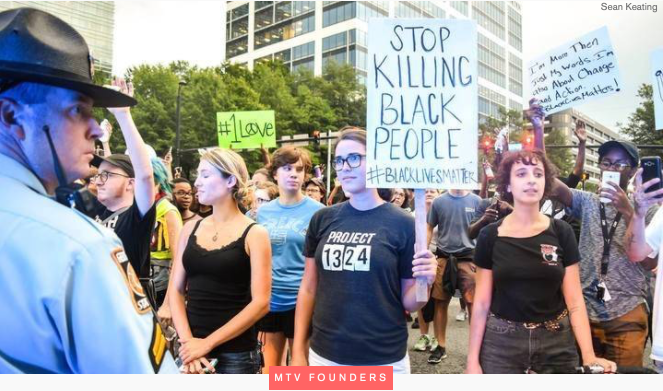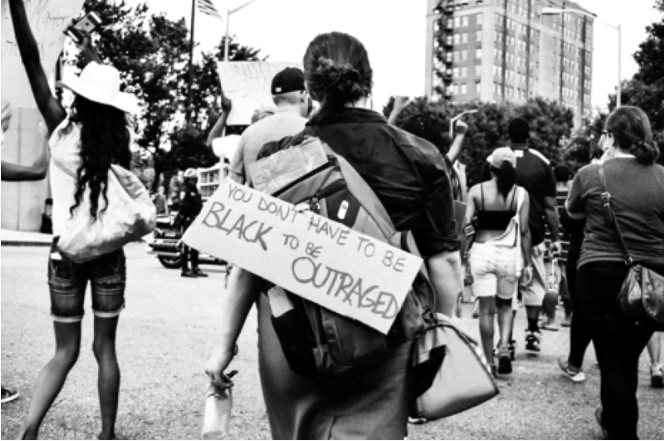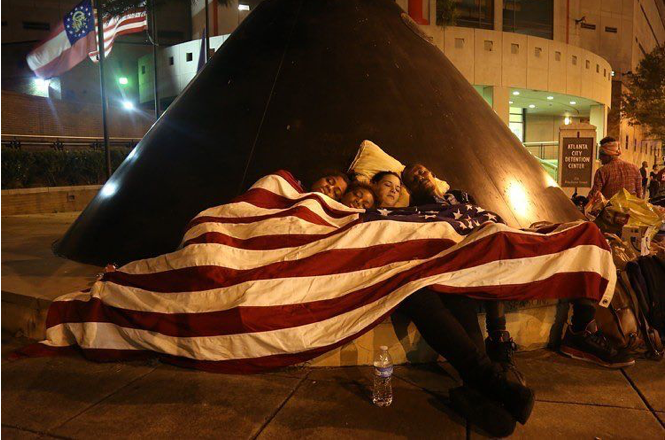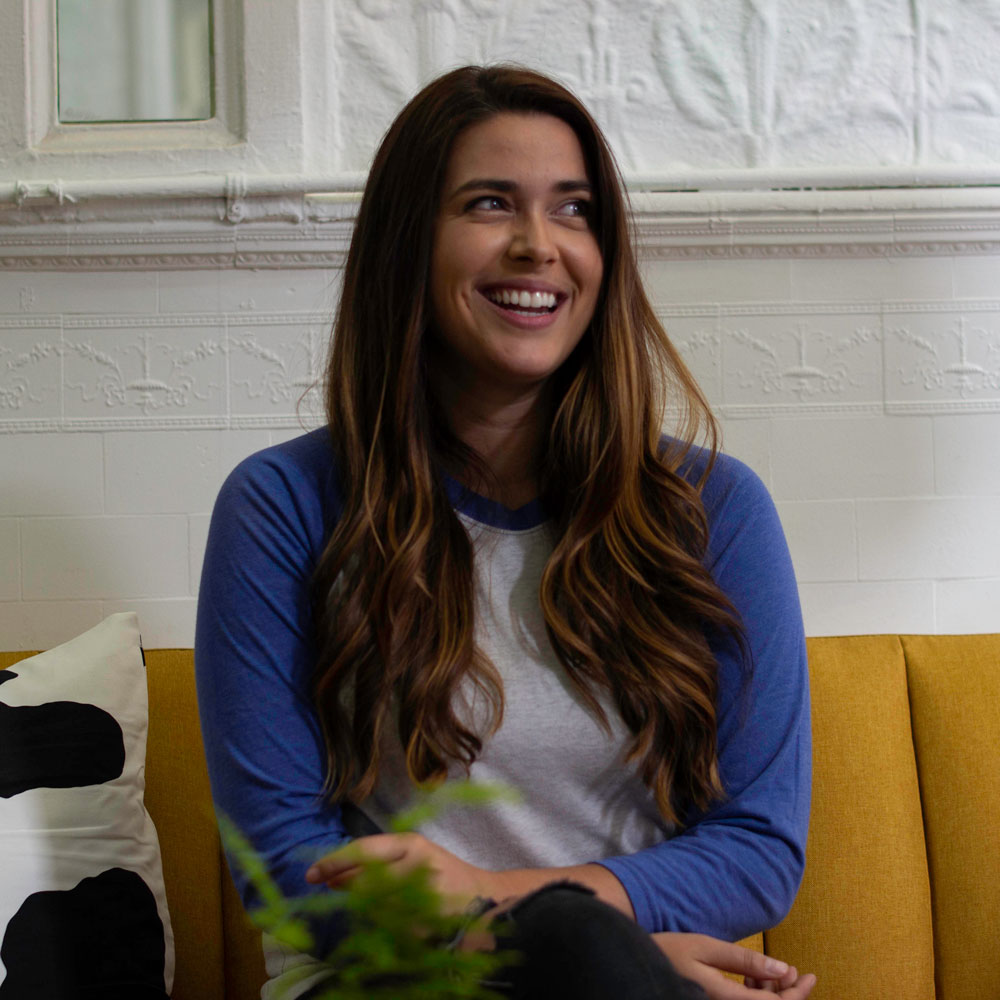
I was marching down Peachtree Road in Atlanta, Georgia, when a police officer grabbed me from behind and threw my things to the ground. Without saying a word, he twisted my arms backward, tightened metal bracelets around my wrists, and pushed me into a steel-clad bus.
Strangers around me took out their phones and began filming — the ability to so easily record civil disobedience and/or police brutality, to capture exactly what so often happens to protesters and share it with the world in seconds, is an important advancement that sets our generation apart from our parents’ protesting days.
At the moment of my arrest, I remembered what a Rise Up coordinator had told me just moments before: “If you get arrested, make sure to repeat your name and birthday over and over again to the crowd so that we know you’re going to jail and we’re able to bail you out.” My adrenaline kicked in. I began to shout my name, making sure I was heard.

I was marching because after Philando Castile was shot and killed during a routine traffic stop, after Alton Sterling was killed at the hands of officers who were given unconfirmed information during a 911 call, and after a black man later identified as 22-year-old Michael George Smith Jr. was found hanging from a tree in Atlanta’s largest park, I simply couldn’t sit quietly any longer.
I was also marching, in part, because I grew up only a few blocks from where Martin Luther King Jr. raised his children — a solidly middle-class neighborhood composed of black, brown, and white residents, where people routinely started conversations with their neighbors on the sidewalk. This upbringing naïvely led me to believe that I was immune to white privilege, that I wasn’t like other white people. It wasn’t until the day that Troy Davis — a black man convicted of killing a police officer, despite extraordinary doubt — was executed that I got it. Under no circumstances was Troy Davis my brother, my father, or anyone I knew. But for black Americans, knowing or even becoming Troy Davis is a very real possibility — from routinely facing traffic stops to unlawful arrests, wrongful imprisonment, and death at the hands of those who should be our protectors.
These horrifying events and the broader reality of racism led 15,000 people to hold peaceful protests over five days in the heart of Atlanta. By occupying public space, we used our bodies to send the message that we are determined to keep the conversation surrounding Black Lives Matter going. However, three days into our marches, despite the helicopters that initially hovered above our heads and the news crews that walked beside us, the local headlines were highlighting the tired police force and their long hours rather than the historical protestor turnout from all races, ages, and backgrounds. The media also failed to pay much attention to the arrests — like my own group of 14, and many others.
Getting arrested was terrifying. For a brief time, I understood what it was like to have absolutely no voice — a feeling black Americans know all too well. Unlike an episode of Law & Order, I wasn’t read my rights and I wasn’t given a phone call. One of my fellow arrestees had Type 1 diabetes, and when he told the officers that his blood sugar was low, they offered to give him one miniature coffee creamer (equaling, he told me, .64 carbohydrates — he needed 14). Another arrestee was denied his HIV medicine despite the importance of its timely administration. For extra style points, the jail we were brought to was all out of food and water.

When our group of arrestees was finally released the following day, we were met by fellow protesters and the morning sun on the steps of the Atlanta City Detention Center. Surrounded by a cheering mass, we were told that Mayor Kasim Reed and our city’s chief of police had sat down with movement leaders while we were in custody and agreed to multiple meetings. Our demands will be centered around mental health initiatives, dissolution of “broken window” policing (the notion that serious crimes can be controlled by over-policing neighborhoods susceptible to petty crime), enhanced de-escalation training for police officers, and ensuring greater accountability for police officers who kill civilians.
Of course, my experiences — when protesting and when arrested — were undeniably shaped by the fact that I’m white. For example, as part of our protesting tactics, non-black protesters were asked to stand on the front, sides, and back of the marches as “white allies,” which is why nearly all the protesters I was arrested with were white. During our 10 hours in custody, our group was rarely separated, and we were held in a different room than the night’s other arrestees. The Georgia Civil Disobedience Fund had money in place if we needed to be bailed out, and pro bono lawyers were on call, working to get our charges dismissed. None of these privileges are regularly available to the average black arrestee.
But this entire experience of protest ultimately taught me how powerful I am — and how powerful we all are when we stand up together. It only took 24 hours for the few determined women who started the march to be joined by 10,000 others who flooded the city’s downtown streets. We not only shared the burden of change, but also exchanged hugs and tears and developed a true sense of community. Over the next few days, we continued to shut down major arteries of the city with our gathered bodies. We even gained national attention when notable Black Lives Matter advocate DeRay McKesson tweeted that Baton Rouge protesters were inspired by Atlanta. By Monday night, while some of us sat in jail, others continued marching to the governor’s mansion. There, without politicians or wealth, protesters roused the mayor and the chief of police out of bed to talk — and not just talk, but to listen.
So get out to a rally, create dialogue online, share the news stories that make you cry or curse, and let’s become the generation that is heard. We may not be able to change everything in a day or even in a decade, but we can voice our grievances and demand that the world listens by truly putting ourselves on the line.

Amber Keating
Founder
Founder. Women’s advocate. Diversity expert. Amber Keating has worn many hats throughout her 32 years. To this day she credits her entrepreneurial spirit to her mom, who instilled in her that the worst thing that can happen is you land back where you started.
Amber started Juniperus to amplify the voices of people who are making the world a better place. She has already worked with the likes of Adobe, the Sierra Club, and numerous political campaigns—with many more exciting opportunities on the horizon.
